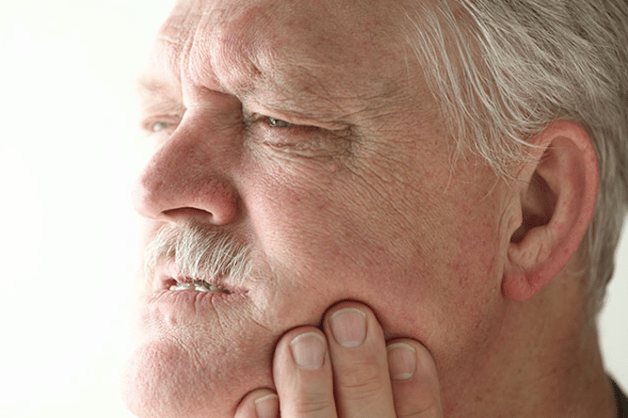
While it is normal and expected that an aging individual is subject to an increased likelihood of oral health problems, proper self care combined with conscientious professional help can work to keep a mouth healthy whether it’s 9 years old or 99.
If you see any of the following signs that your aging parent’s oral health isn’t being properly cared for, the best thing to do is to help make sure the trend turns around as soon as possible.
Sore or irritated mouth under dentures

If your parent is experiencing pain, discomfort, chafing, or inflammation under their dentures, it could be a sign of a damaged or poorly fit denture. Or, it could be due to a fungal build up.
It’s best to have the dentures and the inflammation checked by a professional. If the dentures need repair or adjustment, next steps can be arranged. If the issue is due to an overgrowth of microorganisms, a dentist can prescribe a short-term medication to help resolve it. However, the long-term solution is going to be disciplined oral self care, including brushing, flossing, and using mouthwash.
Unexplained tooth loss
It’s natural for gum tissue to recede slightly as we age. However, that doesn’t mean that unexplained tooth loss is normal.
If your parent loses one or more teeth for reasons unknown, they should be examined by a dentist immediately. It may be a sign of asymptomatic periodontal disease or it could be a sign of a condition related to bone loss (such as osteoporosis).
If their teeth are decaying at or below the gum line, whether they are lost or not, it could be a sign of poor self care and/or poor choice of foods and drinks containing high acid content that wears away the exposed tooth roots that are not protected by enamel. If these issues occur, see these simple tips on how to find affordable dental care for seniors.
Chronic dry mouth
"If your parent is experiencing pain, discomfort, chafing, or inflammation under their dentures, it could be a sign of a damaged or poorly fit denture."
Dry mouth, also known as xerostomia, is a common side effect of many prescription medications, so it can present a problem for many senior citizens on medications. It can also be caused by treatments for certain cancers and diseases like Sjogren’s Syndrome.
Regardless of its cause, chronic dry mouth is dangerous to the teeth and gums because saliva plays an important role in neutralizing acids and cleansing the mouth of microorganisms.
If your parent complains of a chronically dry mouth, encourage them to employ one or more of the following strategies to help resolve this easily treated condition:
- Oral moisturizers, including a gentle mouthwash
- Speak with their doctor about possibly changing their medication or dosage
- Drink more water
- Chew sugar-free gum or suck on hard sugar-free candy to stimulate production of saliva
- Artificially humidify the air in their home
In addition, a dentist may want to apply fluoride gel, or in some other way help protect the teeth during the time the dry mouth is being treated.
Any other unusual or unexplained oral symptoms
While this article could go on for several more pages, the point is simple: Although age naturally brings with it additional health concerns, no dental problem should be ignored or accepted as “par for the course” just because an individual is over a certain age.
Rather, these common issues can provide an opportunity to help your aging loved ones continue care properly for their own oral health, and to see the dentist regularly, so that any signs of trouble can be spotted early and treated successfully.
Interested in ways seniors can save on dental care, up to 50% off of the total cost of services? Find out more about affordable dental care for seniors.

